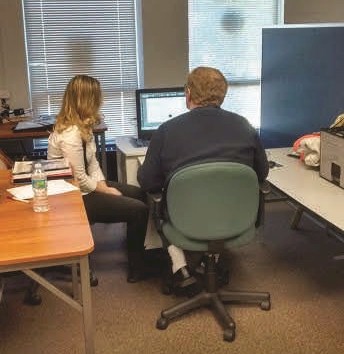
Diamond Schuler, a journalism major at Bucks, is taking four online classes at once. At any given moment of the day she has Canvas open on her iPhone or iPad. Even when she was at a restaurant for her boyfriend’s birthday, she could casually work on her midnight deadline. She does this because Bucks sometimes doesn’t have traditional courses that fit into her busy schedule.
She loves that she can work on her classes on her phone no matter where she is, even though online classes can be overwhelming. Without seeing her teachers she has to rely on email, and it’s hard to ask classmates for help since she usually doesn’t know who is in her class. But it’s all about time management.
Schuler has had her share of stressful online classes. She took a creative writing course over the summer and it was too fast-paced and mind boggling. Thankfully the professor made himself accessible and they met face-to-face even in the middle of the summer.
Every online teacher Schuler has had has been extremely thorough and helpful, but “it definitely is weird that I’ve never met some of those teachers face-to- face, like if I saw them on campus one day I wouldn’t even know who they were,” she said.
Online classes are big and here to stay. Bucks’ first distance learning class started in 1994. Online classes started in 1998 with a learning management system called Alta Vista Forum. Today, 27 percent of the seats taken at Bucks classes are online. The majority of those students take combo classes. Online classes are customizable, with no set formula. Each instructor can adapt their course to suit their needs and teaching style.
Online classes have become more popular because of their flexibility. Students love not having to drive to class and being able to do their lessons on their own time. It saves time, gas, and is convenient for students who do not own their own cars. Outside commitments like work and family can get in the way of attending traditional classes. Whether you have to raise kids, take care of a sick relative, work full time, or just fit that final class in your schedule, online classes online classes can make school more doable.
Psychology Professor Caroline Genevose has been both a student and teacher of online hybrid courses. She loved the independence online courses gave her. “However, it required more effort to demonstrate that I understood the material via tangible evidence (not simply raising my hand and sharing points of interests), it taught me how to prioritize tasks, research topics, and gain a clearer understanding of my peers’ varying points of interests. I believe online students experience many of the same benefits as I did.”
While online learning has many advantages, some are concerned that such courses don’t provide the same social experience as face-to-face classes. Some feel like face-to- face classes provide more of an “experience” and more memorable moments from person to person.
Composition Professor David Bates has never taught an online class and does not want to. He said that online classes provide opportunities to many people who could not otherwise pursue an education, but that they make student-teacher relationships more abstract. Bates said an online course would make it more difficult for him to gauge a student’s individual needs. He likes to be able to see small gestures like hand movements and vocalized metaphors.
Some students feel the same way.
“There is no face-to-face. There isn’t a relationship (with teachers) except email and I never emailed online instructors,” said 24-year-old nursing major Samantha Szymanek. As for her relationship with her peers there was none; she never talked to them. “When I took a class I just kind of did work and got it done,” she said.
James Goldstein, a 20-year-old nursing major, said he prefers face-to-face interactions and does not even like social media. He is in a combo class that meets once a week, “I think it kinda…takes it (the relationships) further apart because you’re not seeing them as often, just communicating online.”
“You can actually see their (your peer’s) face, you can make friends more easily face to face. Online you don’t know who they are, don’t have much of a connection,” said Ashley Milnes, 19, a Graphic Design major.
But it does not have to be this way, according to some Bucks faculty and staff. “Relationships don’t have to change between students and a professor. Online students can still meet with and talk to their instructors face-to-face or virtually,” said Samantha Gross, Dean of Social and Behavioral Science.
“It’s obvious that as humans we are so much more than what we post, what our profile picture portrays, and the clothes we wear,” said Genevose. “I want students to know that I am approachable and wish to give them a positive experience with conflict. Often, if a student emails an issue that is not concrete or simple to answer, I will invite them to talk about it in person.”
Students can also email professors about personal issues that need to be addressed in the classroom. Genevose used transgender students as an example. If a transgender student emailed her about using a different name than registered with the school she can make that adjustment and grant them privacy. She wants students feel comfortable in the classroom so they can focus on success.
In fact, online courses can actually make it easier for some students to interact. Face-to-face classes tend to cater to the outgoing, the confident. Shy students can feel feel shut out, or be punished with low class participation grades. For these students, writing on an online discussion removes the nervous stutters and anxiety.
“For the student who is less likely to speak out in class… it’s not quite anonymity… you find that the quieter students feel more empowered, less intimidated by other students,” said Georglyn Davidson, director of Virtual Campus/Online Learning at Bucks.
Szymanek said, “Online learning is for some people and not others. People learn differently, like how some people are visual learners.”
Sarah Alu, 21, a fine arts major, believes that tech-savvy students tend to shine brighter in online courses. Stubborn students beware; it is harder for online teachers tell if you are struggling until it’s too late. It’s up to you to ask for help. It can be hard to admit that you are struggling but it’s better than getting a D.
Professor Bates thinks personality type does not matter in this situation, “Yes, some people are more extroverted. Some people are more introverted. But that’s not the point. To be able to function effectively in any human environment you need to be able to communicate successfully, effectively, and this takes practice, whether you like it or not.”
Communication issues worry some students. If the internet goes down, there can be a struggle to balance schedules for group projects. Teachers’ directions can be confusing and you might have to wait hours to get an answer for a simple question.
Milne thinks face-to-face interactions are better for immediate questions. “If you need help with a technique that you want to see visually, the teacher can’t show you, and you need to look up a video instead. It’s more distant. You still get the same amount of attention but have a little restraint. When you ask questions you can’t show, explain,” she said.
Davidson had a different take. “Any time you communicate in writing or email you can’t see emotion, what the person looks like and their body language. I won’t say it (miscommunication) is more common but unless people are careful about it it can occur.”
To succeed in online courses, students have to stay on task and be self-motivated. Some students struggle because, “It is easy to say I’ll get to that later, I’ll get that that later, I’ll get to that later,” said Davidson.
It’s critical for online students to be hyper aware of due dates and tech issues. They need to build a system to balance school and outside commitments.
Genevose recalled, “I’ve had students schedule vacation during an online course, only to find out that their destination did not allow for internet service, or they forgot their laptop, or assumed the canvas app would work perfectly all the time. These are simple mistakes that must be avoided or attended to ensure online success and that burden falls on the student.”
For those who are concerned, Davidson predicts a positive future. Online learning has already come a long way since its infancy 20 years ago. The basic core functions of early online management systems are still there. “However, now the systems can do so much more,” said Davidson.
Video and audio can be easily integrated into course work and teacher feedback. The system is compatible with mobile devices and external apps can be worked into classes. Teachers can grade assignments online instead of going through the hassle of downloading, grading, and uploading again. Group spaces and online tools make it easier for group work to be done at a distance.
Davidson summarized, “When taken advantage of, all of these changes, and more, have definitely contributed to breaking down barriers that in the past may have had students feeling more isolated. So, as technology has advanced, so have the opportunities to more easily create online classes where students feel they are part of a vibrant learning community and not just an individual working his/her way through a subject.”
We already have the tools to make it work. As instructors become more comfortable with media tools it will help lessen some of the disconnect. Online learning will continue to improve just as it has for the past 20 years.

